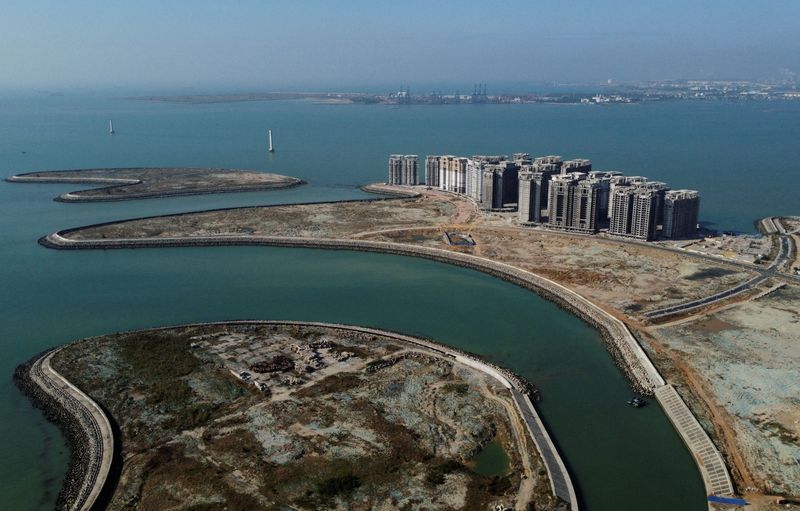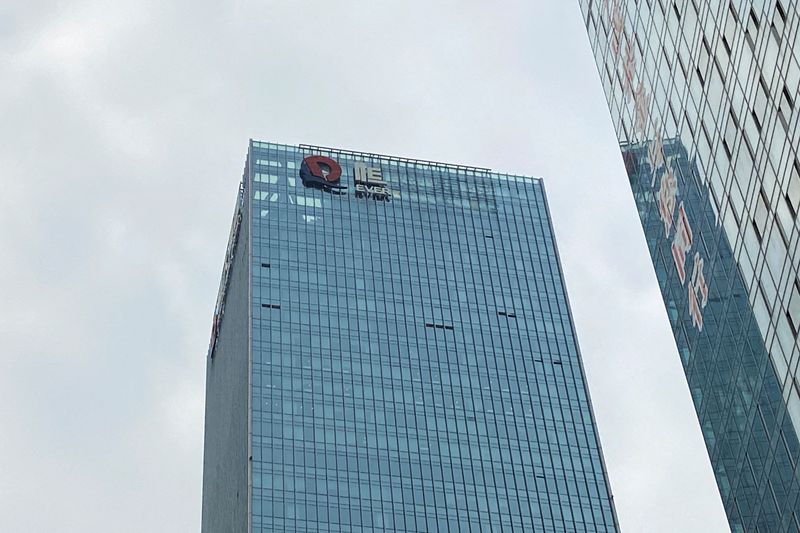By Xie Yu, Julie Zhu, Yew Lun Tian and Clare Jim
HONG KONG/DANZHOU, China (Reuters) - The opening last year of the world's largest artificial resort island, developed by China Evergrande Group for nearly $13 billion, was the realisation of the ambitions of founder Hui Ka Yan, who sketched a design for the project himself.
Now Evergrande is in default to global bondholders, the former Communist Party secretary of the small Hainan island city where Ocean Flower Island was built is serving a life sentence for bribery, and officials in Danzhou city have ordered 39 of the project's towers - roughly 3,900 of the island's 65,000 homes - to be demolished over environmental and construction violations.
The demolition of part of the 2,000-acre, flower-shaped project would add to the woes of what was once China's top-selling developer, which is now reeling under more than $300 billion in debt, struggling to revive sales and repay creditors and suppliers.
Government documents related to the project and details provided by two sources with direct knowledge of the island's development show how the work skirted environmental and zoning regulations during nearly a decade of development, eventually drawing scrutiny from regulatory authorities.
The two sources, who were close to the project and Hui's thinking, declined to be named as they were not authorised to speak to the media.
Reuters couldn't determine when or whether the demolition would be carried out. Evergrande did not respond to Reuters requests for comment or to queries for Hui.
Hainan province officials and local authorities in Danzhou, which has direct oversight of the project, did not respond to requests for comment.
The saga is a cautionary tale for China's property giants as the country under Xi Jinping undertakes a sweeping regulatory crackdown that is reining in the most free-wheeling segments of the private sector economy.
"What is happening in Hainan suggests local governments are tightening their grip on irregularities of property developers," said Li Gen, CEO of Beijing BG Capital Management Ltd, a firm specialising in credit investment.
During a Reuters visit in January, workers had blocked off the 39 buildings with blue metal sheets. As of Monday, Ocean Flower's 39 under-construction residential buildings were still standing. Evergrande has said the rest of the project would be unaffected.
The local government issued the demolition order in December, citing illegal construction and environmental violations, according to local media.
GOVERNMENT SCRUTINY
Situated in what had been a largely rural corner of China's southernmost Hainan province and, the sources say, inspired by Dubai's famous palm-shaped artificial islands, Ocean Flower Island consists of theme parks, five-star hotels, Michelin-starred restaurants, shopping malls, museums and spas, and residential towers.
During the early days of its construction, workers sent Hui, 63, weekly drone footage to review progress, one of the sources said.
In 2017, Hui was Asia's richest man. As recently as July 2021, the former steel technician could be found mingling with power brokers in Beijing at a celebration to mark the centenary of the Chinese Communist Party.
Chinese authorities have been scrutinising the firm and Hui's assets since late last year to determine whether anything was hidden, and the central bank has blamed mismanagement and breakneck expansion for Evergrande's problems.
As Evergrande, now at the centre of China's property sector liquidity squeeze, pushed ahead with the resort island, it ran into environmental issues, in particular over land reclamation that damaged the local ecology, the two sources said.
DREAM PROJECT
Evergrande had been hit with environmental penalties from the Danzhou city government since as early as 2017 over reclaiming land from the sea in areas where it is not allowed, according to a Dec. 23, 2020, document posted on the city's website.
The Danzhou government document also said that Evergrande built the 39 residential buildings using a tourism infrastructure plan, which could not be used for residential development without government approval.
Evergrande was asked by the Danzhou authorities to "improve" the plan, with no specific requirements cited, according to the document. In 2021, the Hainan provincial government said the company had made a plan to transform the 39 buildings into hotels, office buildings and dormitories for employees.
Reuters could not establish whether that plan was approved by any regulator before December's demolition order by the Danzhou authorities.
The Danzhou government document from 2020 said local authorities allowed construction to continue despite environmental violations without elaborating on the reasons.
A Hainan provincial government document issued in early 2019 and posted on the government's website showed Danzhou had levied $34 million worth of fines against the project. These fines were paid, the document shows. Reuters could not determine whether additional fines had been imposed.
Although Evergrande has never commented publicly on the fines, the developer said in a Jan. 3 WeChat post from the official Ocean Flower Island account responding to the demolition order that it had been "firmly and actively" rectifying the environmental issues since 2017.
The 2019 Hainan provincial government document also said the city of Danzhou illegally divided land parcels to make them easier to pass land reclamation review, approving 36 related projects in two working days for Ocean Flower Island.
Danzhou city government did not respond to requests for comment.
ENVIRONMENTAL DAMAGE
As Evergrande's worsening financial troubles came into public view in 2020, the Communist Party's anti-graft watchdog, the Central Commission for Discipline Inspection (CCDI), and the Ministry of Ecology and Environment began to take a closer look at Ocean Flower Island, provincial and central government documents show.
China's Ministry of Ecology and Environment did not respond Reuters requests for comment. CCDI could not be reached for comment through the number listed on its website. There is no listed email address for the agency.
The former party secretary for Danzhou, Zhang Qi, was sentenced in late 2020 to life in prison for taking bribes from unidentified business owners and helping them illegally acquire environmentally protected land, according to an article the CCDI published in early 2021.
The CCDI article identified Ocean Flower Island as an example of a project Zhang facilitated illegally to "gain political capital", saying he "used islands to get rich", but did not say whether he accepted bribes in relation to it.
Zhang pleaded guilty to the corruption charges and surrendered all bribes to authorities, state news agency Xinhua reported in late 2020.

Chinese courts do not typically release judgment papers on corrupt officials to the public, and his lawyer was not identified. Zhang could not be reached for comment.
The CCDI also found that the construction of Ocean Flower had caused permanent large-scale damage to coral reefs and white lip shells.
